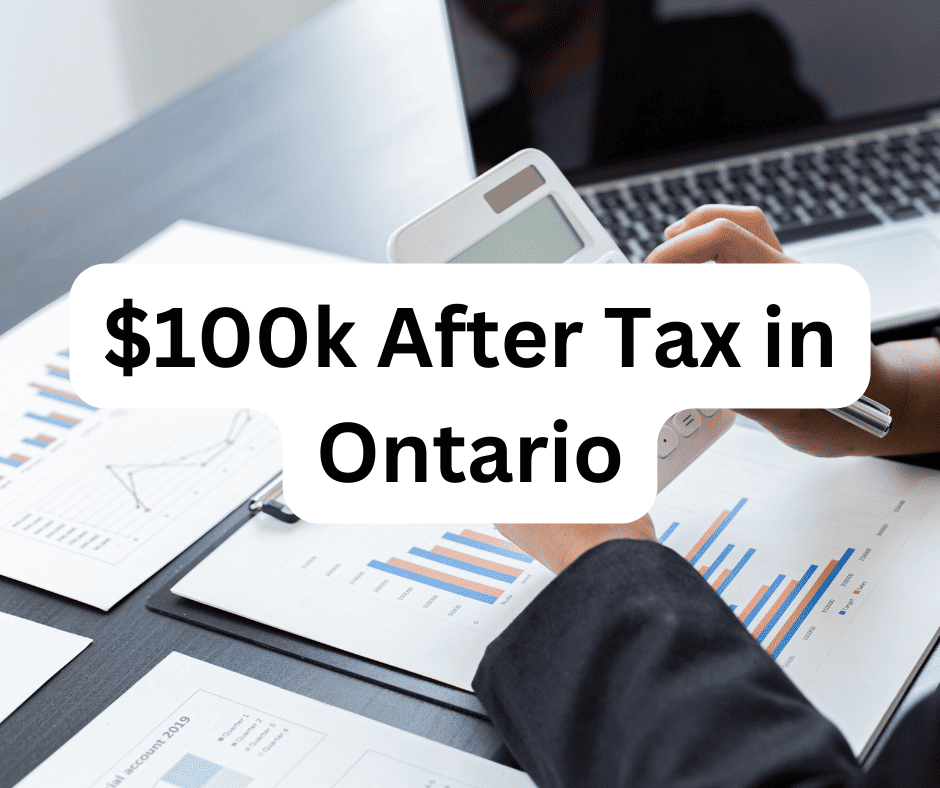A $100,000 salary may sound like a lot, but after deducting taxes, deductions, and living costs in Ontario, the take-home amount will be considerably less. This article will analyze the key components that determine your net income from a $100k salary, including:
Tax Rates in Ontario
The tax rates in Ontario for 2023 on a $100,000 annual salary are:
- Federal tax rate: 20.5%
- Provincial tax rate: 11.16%
- Total tax rate: 31.66%
This means on your $100k salary, you will pay $31,660 in federal and provincial income taxes, leaving you with $68,340 after taxes.
In addition to income taxes, you also have to pay payroll deductions for CPP (Canada Pension Plan) and EI (Employment Insurance), which add up to around $4,500.
So your total tax bill is $36,160, leaving you with $63,840 in your pocket from your $100k gross pay.
Monthly Take-Home Pay
Your average monthly take-home pay after deducting $36,160 in total taxes and deductions would be $5,320.
This is the amount you would have available every month to pay for living expenses like housing, transportation, food, entertainment, etc.
Cost of Living in Ontario
The average cost of living for a single person in Ontario is estimated to be around $3,800 per month. This includes costs for:
- Housing (rent/mortgage): $1,800
- Transportation (car/public transport): $300
- Food: $500
- Utilities: $250
- Phone/internet/cable: $200
- Entertainment/leisure: $250
- Miscellaneous: $500
So your $5,320 monthly net income from your $100k salary would be sufficient to cover average costs for a relatively comfortable lifestyle.
You may also be paying several hundred dollars in debt repayment costs per month depending on your situation. But you would still have over $1,500 left for savings and investments.
Comparison to Other Provinces
Ontario has one of the highest total tax rates in Canada, second only to Nova Scotia. Provinces like Alberta and Quebec have significantly lower taxes, so your take-home pay from a $100k salary would be higher there.
For example, in Alberta your average total tax rate would be around 26% compared to almost 32% in Ontario. So on a $100k salary, you would take home around $11,000 more annually if you lived in Alberta instead of Ontario.
Is $100k a Good Salary in Ontario?
In general, a $100,000 salary is considered a very good income in Ontario. As per Statistics Canada, the median pre-tax household income in Ontario is only around $76,000.
So earning a six figure income puts you in the top 30% income bracket in the province. You have considerably more purchasing power and savings capacity compared to average households.
That said, given the high cost of housing in cities like Toronto, a $100k salary does not go as far today as it did 5 or 10 years ago. But you would still be able to afford a comfortable middle-class lifestyle, especially if you live outside the Greater Toronto Area.
Conclusion
A $100,000 annual salary leaves you with an average monthly take-home pay of $5,320 after taxes and deductions in Ontario. This is a sufficient amount to cover living costs for an above average quality of life.
Your net income would be higher in provinces like Alberta or Quebec due to lower total tax rates. And while $100k is considered a very good salary, rising housing prices do take a toll on actual purchasing power and savings capacity compared to past years.

